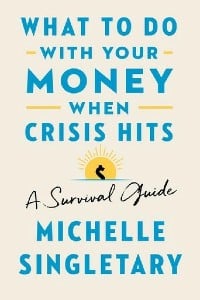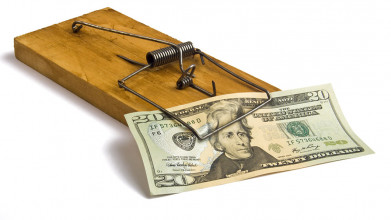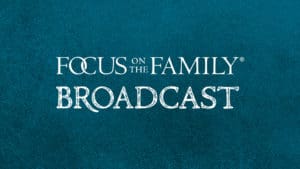Preview:
Michelle Singletary: Think about all your debt as a weight that you would have to carry on a daily basis, because that’s what you’re doing.
John Fuller: Yeah.
Michelle: 10 pounds, 20 pounds, 50, just imagine holding that debt. And so, if you hate debt, you hopefully will take on less of it or none of it.
John: That’s Michelle Singletary, and she was our guest last time on Focus on the Family with Jim Daly. And she’ll help you better manage your money wisely a-as things are tough and might get tougher. Thanks for joining us today. I’m John Fuller. And, uh, Michelle has more wisdom for us as we continue the conversation.
End of Preview
Jim Daly: John, it’s always great to visit with Michelle. She brings a great smile and a wonderful attitude to-
John: Mm-hmm.
Jim: To the broadcast booth here. But, uh, she has some fun incites regarding our attitudes about money, probably fun and stern-
Michelle: (laughs).
Jim: … insights is the best way to say it. And these are some challenging times for many, many people. I mean, the economy is kinda bumpy. Uh, some sectors are doing well, others are not. And, uh, employment issues are there, and hourly wages are tough, that kind of thing. And Michelle, uh, says, “When you live by God’s principles, he’ll bless you.” And she’ll encourage you with that message today. It’s not the name it and claim it kind of thing. Right?
Michelle: That’s right, no.
Jim: It’s, it’s really about how to manage your manage well so you honor the Lord and those around you.
John: Mm-hmm. And she has, uh, great expertise and experience as she writes a column for the Washington Post on finances. She’s written a terrific book, What to Do with Your Money When Crisis Hits. And we have copies of that here at the ministry. Stop by the website, focusonthefamily.com/broadcast, or give us a call and we’ll be happy to tell you more, 800, the letter A, and the word FAMILY.
Jim: Michelle, welcome back.
Michelle: Oh, thank you for having me.
Jim: (laughs) It’s so much fun. This is so good. And it’s so practical. And it does kinda cut right to the core. Everybody has to deal with finances, if you’re a billionaire or you’re not making it. Money is what drives the economy. It’s how you pay for things, right?
Michelle: That’s right.
Jim: And so, we all have to figure it out. And it’s always better when you’re biblically informed about what the priorities are from the Lord. And you’ve done such a great job-
John: Mm-hmm.
Jim: … in the discussion last time. If people missed it, they should go to the website or get the smartphone app.
John: Right?
Jim: And you can hear it that way. Uh, let’s kick it off with this question. Survey showed that only about 30% of Americans have a long-term plan for retirement-
Michelle: Yeah.
Jim: … et cetera. Explain why people don’t take that basic step, only 30%? I would think 60%, 70% would think about, when I’m not working, how am I gonna make it?
Michelle: Yeah. Well, you know, there’s lots of pressure on people’s paycheck. Um, you know, you got children, you know, the cost of living is expensive in so many cities. Sending your child to college costs so much. Um, even when you take on debt, you know, you still, there’s a hole that you have to fill. And so, there’s so much pressure. I completely understand it. And there’s also the pressure from… When we watch television and everything is saying to you what you have is not good enough, that you’ve got to upgrade, you gotta get this. I mean, around the holiday times, there’s always these car commercials with a big bow on it. It, and, there was a series of commercials where people were destroying very good cars so they could upgrade to a new car. There’s a lot of pressure from people. It’s very hard to resist that.
Jim: Mm.
Michelle: It’s very hard. And so, it’s hard to think, in your 20s or 30s, that at some point you’re not gonna be making a regular paycheck. How am I gonna live? And so, my job is try to get people to do that, that you’ve gotta look long term. Short term, yes, but also long term. I don’t believe that social security is gonna go away, but it’s in financial trouble. And so, who knows what the rules are gonna be? It’s gonna be there, but maybe full retirement will be 70 instead of what it is now, up to 67 for some folks. And so, you must carve out some money for the time where you may not want to work or can work. And also, look to the folks in your life. Oftentimes, we are so prideful that we don’t say, “I need help.” And those of us who know there are people in their lives, I’m speaking to you. If you know there’re people in your lives that are struggling, some by fault, some by not, you know, don’t wag your finger. My husband and I actually have an account. We call it the family finance account. And we put money in this account knowing that there are people in our family that we are going to have to assist.
Jim: Hmm.
Michelle: So, when the pandemic hit and one of our relatives lost her job due to no fault of her own, she was in hospitality in a restaurant, uh, couldn’t pay her rent, we paid her rent for a couple of months. She didn’t even ask.
Jim: Right.
Michelle: We knew. So, I just said, “Hey, what’s your rental company? You know, I’m gonna send money off to them.” “What? What? I’m gonna pay you back.” I said, “Absolutely not. This is not a loan. We don’t lend people money.” And, you know, when s-she, another situation, had a, a car broke down, helping to pay that. And so, that’s why you save extra. You, you must save out of your abundance, like Joseph did, right? And then, you look around to those in who, in your life that you can bless without wagging your finger, without, you know, “Do, they don’t deserve to be helped.” That is not the time to do that. And so, you help them. Now, I’m not encouraging people to enable bad decision-making.
Jim: Right.
Michelle: I’m not saying that. What-
Jim: You’re saying tough circumstances.
Michelle: Tough circumstances.
Jim: Yeah.
Michelle: When a relative lost her job during the, uh, uh, Great Recession, um, she had a good job, good with her money, but she lost her job. My husband and I had enough in our family fund to cover her car payment for a year.
Jim: Ahhh.
John: Hmm.
Michelle: And that gave her freedom to pay her rent and buy food. And that enabled her not to panic and get a payday loan.
Jim: Right.
Michelle: Or use credit. And we never missed the money. And guess what? We were tithing at the same time. We were putting money in our kids’ college fund at the same time. And people are like, “She makes a whole bunch of money.” That’s not necessarily true. We just saved over and, you know, two or three decades. So, if you do that, like with the college fund, we were able to send our kids to college with no mon- with no debt, because we started saving when they were wee little people.
Jim: Right. You know, and that’s a good point. I remember, uh, Dr. Al Mohler was on our board. And he told me a story. You know, he’s in the business of education. He’s the president of Southern Seminary. He just talked to a mom whose daughter, she had acquired a French literature degree for $200,000 of student debt. And the mother was lamenting at saying, “What, how is she gonna make that money back?” And it, it’s not meant to avoid pursuing your dreams if that is an interest. But you better think ahead-
Michelle: That’s right.
Jim: … and decide how you can pay that without debt, you know, save for your college degree. Especially if you’re gonna get a degree that, you know, doesn’t pay back-
Michelle: Right.
John: … probably.
Michelle: Right.
John: Because, you’ll end up being that teacher.
Jim: Mm.
Michelle: That’s right.
John: But, I, I would assume you would agree with that.
Michelle: I absolutely agree. And I think that, in America, we have said everybody has to go to college, which is not true. There, there’re different careers where you can, don’t have to have a college degree. But many jobs do require that. And so, what I tell parents is, if you had not been able to save to send them to college with no debt or little debt, then you have to rethink the college experience. And that’s okay. So, maybe they go to community college for two years.
John: Yeah.
Michelle: And then, transfer to the four-year university. They still have the degree from the four-year university. You don’t even have to put that you went to a community college. Although, I would encourage that you do, because I think that shows that you were making a smart decision.
John: Mm-hmm.
Michelle: I’m a huge fan of community colleges in this country.
Jim: Yeah.
Michelle: Um, they prepare you. And theirs is so… Um, you know, we often talk about community college like a 13th grade. And there’s a lot of, you know, criticism about this, you know, that path. But if you haven’t saved, you have to live your financial truth.
Jim: Yeah, no it’s good. I was proud of my son, Trent. You know, he was enrolled in a four-year college. He looked at the cost, during COVID, and knew it was going to be online teaching. And he came to me, that’s the sad part, it wasn’t me going to him.
Michelle: (laughs).
Jim: He came to me and said, “Dad, why should I pay $3,000 for a class when I can get it for $300 at the community college?”
Michelle: Good for him.
Jim: I said, “Man, you’re making good choices.”
John: Mm.
Michelle: Wow.
Jim: That’s a great thing. And that was all on him.
Michelle: Yes.
Jim: I mean, we didn’t pressure him that way.
Michelle: That’s right.
Jim: And, you know, that, that does give you a sense that he understands money.
Michelle: That’s good for him.
Jim: And that’s good, good for him at-
Michelle: That’s absolutely-
Jim: … you know, young at 19, 18.
Michelle: It’s so hard to buck this trend of having a certain degree from a certain university. And I tell this story all the time. I, you know, my parents abandoned me, my grandmother raised me, my grandfather was an alcoholic, you know, a lot of issues. Went to, you know, public schools. Went to a state university. And I ended up at the Washington Post.
Jim: Yeah, that’s amazing.
Michelle: And the guy across from me, who is a dear friend, good journalist, he, private schools, you know, silver spoon, the whole thing. Went to Harvard.
Jim: Yeah.
Michelle: We ended up at that the Post at the same time. Right?
Jim: Desks next to each other.
Michelle: Desks, desks next to each other. He had a path, I had a path.
Jim: That’s pretty funny.
Michelle: And I believe that, if your child is, um, tenacious and smart, they will get there, that you don’t have to have that name brand degree.
Jim: Yeah.
Michelle: If you can’t afford it, we must live within our means. Because, there will be times when things might get tough. There’re people who lost their job who never thought that they would lose their job.
Jim: Oh, yeah.
Michelle: And they weren’t prepared for it.
Jim: Right.
Michelle: Uh, and so, you-
Jim: Well, let me ask you, in that regard. That was the next question I wanted to get to in the book. You talk about emergency fund and life happens fund. I think I lean towards the life happens fund. (laughing) That sounds like a fun fund to be part of. But what are, what are those two-
John: Spontaneous. (laughing).
Jim: … the emergency and the life happens?
Michelle: Yeah, so it’s not what you think, the life happens fund. (laughing).
Jim: It’s to tickets for the movie?
Michelle: No, no. So, the emergency fund is that fund you always hear about, um, three to six months living expenses, so what it costs to run your household for three to six months. That’s a lot of money for anybody really. But the whole idea is that it’s there if you lose your job. It’s there, say, you have a good job but you run out of sick leave. We, those of us that have good sick leave policies don’t realize that many Americans don’t have sick leave. And so, if they have to take off because they’re sick or their child’s sick, they don’t get any pay. So, that’s the emergency money. That’s the set it and forget it. Don’t even think about using that money.
Jim: Mm.
Michelle: The life happens fund is for when things in life happen. Your car breaks down. Your kids, if you’ve got kids, they’re gonna break something in you house.
Jim: (laughs).
Michelle: If you have a pet, you know, the veterinarian fee. I mean, that’s for the things in life so that you don’t touch the emergency fund. And that fund, I tell you, people who create it say it’s a lifesaver. And, you know, there’re always these benchmarks, but just save what you can when you can. Because, if it’s just $25 or $100, you know, oftentimes… You know why people buy new cars? Do you… It’s not because of the new fancy whatever.
Jim: They don’t break down as much?
Michelle: No.
Jim: (laughs).
Michelle: Well, that’s also true. But they often buy a new car, because they don’t have the money to repair their current car.
Jim: Oh, hmm.
Michelle: It is easier to buy a new car than to get the money to repair your car without a lot of debt that’s like 20%, if you put it on the credit card. And so, people will come to me, “Oh, my car has a $1,500 car repair. I’m thinking I should buy a new car.” And I’ll tell them, like, “Okay, I’m not a math genius. I do have a master’s degree in business, but I’m not a math genius. $1,500 and $30,000 for an average car, which is more?” (laughing).
Jim: That’s a good question. It is, it does push on the want-
Michelle: Yeah.
Jim: … button though. And, you know, it’s nice to drive a newer car. The air conditioner works, all that good stuff.
Michelle: Yeah.
Jim: But sometimes, you may not be able to afford it is your point.
John: Mm.
Michelle: That’s exactly right.
Jim: Let me, let me ask a question, and, uh, I think this will wrap up the kid section, perhaps, but, the 20-something. And, you know, it’s tough. I mean, they are, maybe they do have some school loan debt, and, you know, they’re trying to get started. But guess what? It’s, it’s too tough. I can’t make the rent. You know, groceries are a little tough. So, they’re gonna come back to mom and dad’s house just to recalibrate. Speak to some of the rules that you have developed that set the game plan for that situation.
Michelle: I think it’s a wonderful idea for them to boomerang back home. And it’s so un-American. Because, they’re like, “When you get 18 and go to college, just go out there and figure it out yourself.”
Jim: Yeah, right.
Michelle: And we, we couch it in a sense of they gotta be financially independent or they’ll never know how to handle money. That is not true at all. I am a huge advocate of multigenerational housing. In many parts of the world, it’s normal-
Jim: Right.
Michelle: … for mult- different generations to live in the same household. And why?
Jim: Because it’s so expensive in those countries.
Michelle: Because it’s so expensive.
Jim: Mm-hmm.
Michelle: And so, here in America we say, “Everybody got to have their house.” That is not sustainable, particularly in, in, in, uh, metropolitan areas where rent is so high.
Jim: Yeah.
Michelle: And, and so, my husband and I begged our adult children, when they grad-graduated from college, to stay home. Now, mind you, remember, they don’t have any student loan debt. But what we said is, “If you stay home for several years, not one or two, but several, and save the majority of your paycheck,” so we’re talking 80% or 90% of their take home pay, when they launch, they will have enough to pay for a home outright or close to it.
Jim: Huh.
John: huh.
Michelle: And so, you know, we show them the numbers. Now, they were not, you know, they were like, “We wanna be on our own.” But they looked at the numbers and they said, “You’re absolutely right.” And so, all three of our 20-something-year-olds are living with us. And the last one, who, you know, she’s my little nemesis (laughs), so.
Jim: Ooh.
Michelle: And she’s like, “No, no, no. I’m gonna…” You know, ’cause we clash a lot. And so, she said, “No, I’m gonna get an apartment.” You know, she’s a new teacher. “I’m gonna be out there.” And so, then she looked at the rents.
Jim: Yeah, $2,500, $3,000.
Michelle: Exactly.
Jim: Yeah.
Michelle: And it would take-
Jim: It’s a mortgage payment.
Michelle: … a full paycheck.
Jim: Yeah.
Michelle: And she came to us and she said, “You’re right. I’m gonna live at home.”
Jim: (laughs) So, she’s wise.
Michelle: And so, now she is saving a great deal of her paycheck. And, and here’s what else happened, particularly with our oldest, because she was living at home, because she’s been working a little longer, she’s saving that 15% of her, her money for her retirement account. And she has a non-retirement investment account. Because, she doesn’t have to put all this money-
Jim: Yeah.
Michelle: … in rent. And it, you know, it, it doesn’t work for everybody. I understand. Maybe they live in a different city. Maybe their home life wasn’t great, and so they don’t wanna go back into that dysfunction. I get that. But if you’re listening and you’re a parent, and you have the room, just think, just for a blip of their life, ’cause we’re just talking a blip. If you live as long as you… Most Americans live till their 80s or 90s. It’s just a blip.
Jim: Yeah.
Michelle: And this is something my daughter said to us. ‘Cause we, I asked her, you know, “Are you ever worried about taking care of us when we get older?” And they said, “Of course not. We know you and daddy save a lot of money.” But she said this, “If you become so ill that you run through all of that money, you have taught all of us how to handle our money so that we can help you.”
Jim: Hmm.
Michelle: “And not only that. You have taught us to work together. And so, it will not fall on just one of us. And the team of us can take care of you if we have to.”
Jim: Way to go mom.
John: Oh, that’s beautiful. And that’s right from the heart of Michelle Singletary. She’s our guest today on Focus on the Family. And, uh, we’re so glad to have her. She’s talking about so much of they, uh, contents, but there’s so much more in the book, What to Do with Your Money When Crisis Hits. And we encourage you to call 800, letter A, and the word FAMILY to get your copy, 800-232-6459. Or stop by focusonthefamily.com/broadcast.
Jim: Michelle, let me ask you again some practical questions. When it comes to the 401(k) or a nonprofit 403(b), they’re kinda the same type of retirement accounts, but in that context, you advise to never or rarely take money out of those accounts, because you’re shortening your retirement then.
Michelle: That’s right. If you can… Now, there are some crisis times where maybe you’ve lost your job and you’ve gone through all your savings. But honestly, you need to see that pot of money as not accessible until-
Jim: Yeah.
Michelle: … you retire. So, you don’t tap it for that down payment on a home. You wait and save it. You don’t tap it when you wanna pull it out to maybe pay for college expenses. You don’t. You send the kid to a community college, let them commute. You know, all those other things. You don’t touch that money. Because, we know that more and more Americans are living, you know, to 90s and to 100. And you’re gonna need that money to help take care of you. So, I, that’s a sacred pot of money that you just oughta leave. And when you change jobs, lots of folks change jobs and cash that money out.
Jim: Rather than roll it over.
Michelle: And roll, rather than roll it over, right. And if you take, take it out before your 59 1/2, you gotta pay a 10% penalty and ordinary income tax. And so, by the time you take that money out, you have given so much to the government at a time when you shouldn’t, that you actually don’t net as much as you think you’re netting. So, just, you know, set it and forget it, and just leave it there. Because, you will need it for retirement.
Jim: Right? You, you, uh, counseled a woman who, I think, was about 56. She was looking to retire at that point. She kinda thought she had it together and she’d get a pension and some other things. I think this is a great illustration where a lot of people are at. W-what happened with that woman?
Michelle: Well, she wanted… “I need to retire early.” And she’s like, “I’m gonna retire.” And I said, “Okay. So, what’s your retirement income like?” She didn’t know. I said, “Well, how much you gonna get from the pension?” She didn’t know. I said, “Well, how much are you gonna be pulling from your retirement savings?” “I don’t know.” I said, “Girl, you’re not ready to retire. You don’t have answers to any of my questions.” Um, and she actually ended up not retiring, because she wasn’t gonna get enough to really fund the life that she wanted. And I said, you know, some things like she was also thinking about buying a new house. I was like-
Jim: Without income
Michelle: Without income.
Jim: Yeah.
Michelle: I thought, what are you doing?
Jim: Right.
Michelle: Um, and so, you know, when you, when it’s time to retire, you’re getting close to it, you need to look at, what is going to be your retirement budget, because you’re not gonna have that steady money coming in. My husband and I have been doing pre-retirement income for us (laughs), uh, planning for about 20 years. Um, and I’m so glad we did that. Because, there’s some things that we changed, some, even some habits that we changed so that we can make sure that we have enough.
Jim: And it’s a little interesting and observational in that ex-example with that woman is she, she just thought she had it-
John: Yeah.
Michelle: That’s right.
Jim: … and never really-
Michelle: Never did the numbers.
Jim: … looked into the numbers.
Michelle: Didn’t crunch the numbers.
Jim: I think a lot of people are in that space. You know, you just gotta, you gotta make sure you’re calculating what you’re gonna need-
Michelle: Right.
Jim: … how long you think… You know, nobody knows how long they’re gonna live.
Michelle: Right.
Jim: But like you said, people are living a lot longer than they used to, which actually goes right to the next question with social security. What’s the best rule of thumb when you’re looking at, you know, when do I actually file for social security and start taking it?
Michelle: Yeah. So, it’s a very individual decision. Because, a lot of financial experts will say, “Well, you must wait till 70.” Well that does not apply to a lot of people. Maybe they didn’t save, they can’t work anymore, and there’s no point in you suffering until 70. If you need to take it, take it at 62. But if you can wait, there is a benefit to waiting. Your benefits go up every year that you wait. And after your full retirement age, um, it even goes up higher, about 8% a year till it maxes out at 70.
Jim: So, 70 is kinda the, the max out.
Michelle: That’s right. Now, my husband and I have different… (laughs) You know, he wants to like, “Let me just take this money and we’re gonna go travel, um, because we’re good savers, everything’s in place.”
Jim: I like your husband.
Michelle: I know, right? (laughing)
John: That’s the life fund.
Jim: Yes, the RVing experience.
Michelle: And so, he says, “You never know what your health is gonna be like, so take it and enjoy it.” And I was like, “Oh, okay.” So, we’ve sort of decided to kinda split the difference. Like he might, he’s gonna take it at full retirement and I’ll probably wait till 70. And that way, we kinda have both. Um, but I think you look at h- what you have and make that decision. And if you can wait, it makes sense to me if you can wait till 70. Because, then you get that increase. And because the stock market is up and down and crossways, that’s a guarantee 8% return that is gonna be there for you. And I think that’s a smart decision, if you can wait. Or split the difference, right? But the most important thing, this is what you talked about, Jim, is that work the numbers, make sure that you make an informed decision based on your individual situation.
Jim: Yeah. Michelle, right at the end here, I really wanna talk about the spiritual perspective on money. I mean, the Bible talks a lot about money. I mean, I think it’s the number one or two topic-
Michelle: Yeah.
Jim: … in the Bible. The Lord is very aware of money and how it’s used and how it’s spent. He talks about the importance of tithing and giving, and those kinds of things. I mean, being a financial planner, at the top of your game really, working at the Washington Post, writing books, doing all the interviews, NPR, I mean you’re right in the sweet spot in terms of-
Michelle: Yeah.
Jim: … communicating. H-How do you see that junction of the Christian faith, God’s view of money, and the practical experience of being a human in this life?
Michelle: Yeah.
Jim: (laughs) There’s a big question.
Michelle: I know, that’s a big a question. So, I’m, so I’m not a official financial planner. I just wanna make sure people understand that.
Jim: Okay, good.
Michelle: So, but I do have a master’s degree in business. And I have been in financial ministry for decades, really. Although, I only look 29. (laughs).
Jim: Absolutely true on all counts.
Michelle: So, I, I think that the Lord has said… This is how I look at it. He has blessed you with resources. And I know that he’s looking to and from for those who are handling those resources well. And when he sees that, I believe that he increases your abundance not so you can buy more stuff, so that you can help others. And so, I believe, that all… There’s so much in scripture that is a guideline for how you handle your money. That is just wonderful proverbs, don’t be a borrower. You know, and if you’re gonna be a borrower, get out of it. There’s even a scripture about don’t cosign a loan. I mean, the scripture’s like, “What are you doing? Don’t do that,” you know.
Jim: (laughs).
Michelle: And even in, when he talks about the whole armor of God, because sometimes, as Christians, we like to, but you know, say these phrases, “Well, God will make a way,” and he will. But scripture is clear that you are supposed to do some things. So, when in the home of God, there’s a part of the scripture that says, “After you’ve done all that you can, then stay in.” And that’s what Lord said. So, all mean, have an emergency fund, live below your means. Don’t live the American dream on debt. Live your financial truth. Help other people. Don’t just save for yourself.
Jim: Hmm.
Michelle: That’s selfish. Do what Joseph did, save. And save not even knowing that you’re gonna be able to help somebody else.
Jim: Yeah.
Michelle: And then, after you do all of that, the blessings will come. It’s not a tit for tat. I’m saying that. ‘Cause I don’t believe that. And I know that some ministry’s like, “If you give, he’s gonna give you back.” That’s not what I’m saying. I think that you can position yourself to be a blessing to your immediate family, your extended family, your county, your city, the country, and the world.
Jim: That is so well said. And I would think, when you talked about that fund that you have, the family fund to take care of that, that’s such a… You must feel blessed to be able, you and your husband to be able, be able to do that for your relatives and for your friends that are in need.
Michelle: Yeah, I’m tearing up, ’cause I… (laughs).
Jim: Yeah, I mean it’s beautiful.
Michelle: I mean, ’cause here’s this woman who took in five grandchildren.
Jim: Yeah.
Michelle: She was a nursing assistant at a hospital, so she never made a whole bunch of money.
Jim: Yeah.
Michelle: She made the decision to take us in and care for us. And she didn’t even take the cash payment that they were offering-
Jim: Wow.
Michelle: … because she was so proud. And also, at that time, they were so intrusive into your family life, and it was dehumanizing to her. So, she didn’t take the cash payment.
Jim: Wow.
Michelle: She took us in and raised us. And if I can just give back a little bit of what she did for me, my life would not be in vain. I don’t do what I do, writing books and, and all the things that I do just to have more stuff. Because, when I’m gone, that stuff isn’t gonna mean anything.
Jim: Right.
Michelle: But in, when I cl- I’m sorry.
Jim: No, it’s good.
Michelle: When I close my eyes for the last time, I wanna be able to meet the Lord and say, “You know what? I had a ministry to help people get outta debt. And when they got outta debt, they had the freedom.” I have a ministry that, if you teach people to handle their money, they don’t have to cheat on their taxes. They don’t have to skirt the law. They don’t have to cheat. They don’t have to run after quick, um, you know, scams. You know, they don’t have to be-
Jim: Right.
Michelle: … scammed because they have the money. They don’t have to worry about… They don’t have to play the lottery. So, I feel like that’s what I was meant to do, to show people that you can live a wonderful life without a lot of stuff. I mean, like, you know my husband and I celebrate anniversaries and things. We don’t really get each other a whole bunch of gifts, because I’m thinking-
Jim: (laughs).
Michelle: … “God gave me the most amazing husband. He’s so kind, and generous, and loving, and patient.” And I thought, “There is nothing he could buy at a store that would be anything that other than what he is.”
Jim: Blessed of all men-
Michelle: Right.
Jim: … to have you as a wife. (laughing).
Michelle: I know, right?
John: Yeah.
Jim: No, that’s amazing. But just, it’s so sweet. And you’ve got to know, let me just say, everything I see in you, you’ve done it.
Michelle: I-
Jim: You’ve done it.
Michelle: I hope so.
Jim: So, don’t strive in doing it.
Michelle: I, I really hope so.
Jim: Because, you’ve been such a great example. And you put it into a book for others to follow and speak about it in your great positions that God’s given you.
Michelle: Yeah.
Jim: So, Michelle, well done.
Michelle: Thank you.
Jim: Well done thy good and faithful servant.
Michelle: That’s what I hope.
Jim: Man, if you want a copy of this book, which I can’t imagine you don’t want a copy of this book. But get ahold of us, What to Do with Your Money When Crisis Hits. It’s kinda the, uh, the book to Joseph, I would think.
Michelle: (laughs).
Jim: But what’s so fun about it is it’s very practical. It’s down-to-earth, things you can do to prepare for the rainy days, and the wonderful things that Big Momma taught Michelle. I think that’s so fun.
Michelle: Yeah.
Jim: What a woman. I woulda loved to have met her. Um, she reminds me of other people in my childhood. But man, get a copy of this book. And if you can support the ministry in doing so, it kind of is a win-win. Because, your dollars go right to ministry. We’re not paying shareholders. And, uh, and we’ll send you the book to say thank you for supporting the ministry. If you could do that monthly, great. Uh, if you could do it a one-time gift, that’s great too. If you can’t afford it, get ahold of us, we’ll trust others will cover the cost of that.
John: Yeah, we’ve had so many different topics jammed into the past couple of days. And there’s really so much more in the book. Donate as you can. And, uh, we’d be happy to tell you more. The book, again, is called, What to Do with Your Money When Crisis Hits. And our phone number is 800, the letter A, and the word FAMILY. And you can find out much, much more about Michelle, the book, and how to partner with Focus on the Family all at our website. It’s focusonthefamily.com/broadcast.
Jim: Michelle, again, thanks for being with us. I can’t wait till next time.
Michelle: Oh, thank you-
Jim: (laughs).
Michelle: … so much for having me.
Jim: Take care.
John: I’m so glad you could join us today for Focus on the Family with Jim Daly. On behalf of Jim and the entire team, I’m John Fuller inviting you back next time as we once more help you and your family thrive in Christ.






















